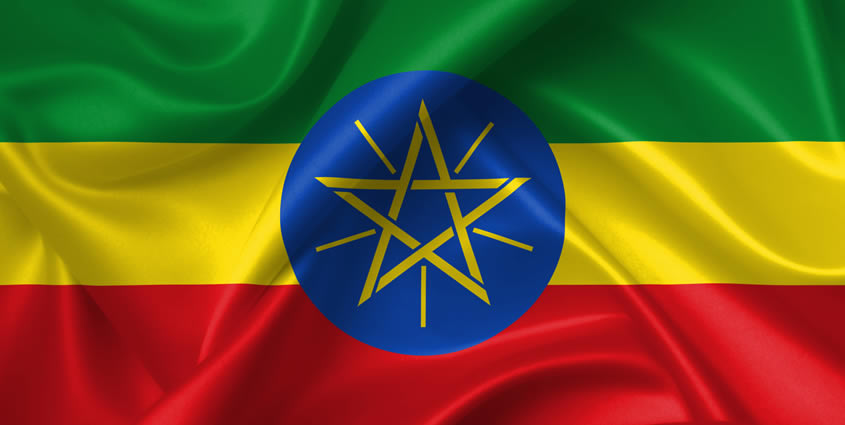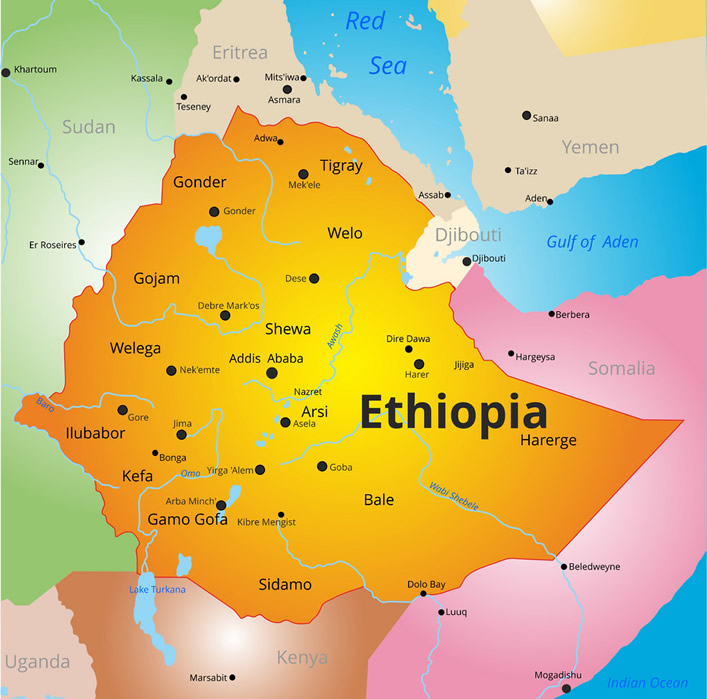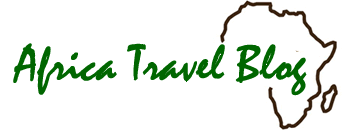Ethiopia is a prominent East African Nation, situated to the west of Somalia and to the north of Kenya. The Country was home to one of the longest serving monarchies in Africa and one of the oldest independent nations in Africa. Ethiopia unlike other African countries was never colonized and resisted attempted invasion from the Italians.
The decisive war was fought at “the battle of Adowa” which resulted in the defeat of the Italy by the Ethiopian Army. The end to the monarchy in the country occurred in 1974 when Emperor Haile Selassie was overthrown by the Derg. These events led to a tumultuous time in the country’s history.
There were a number of civil wars and coups which led to the loss of many lives and affected the development of the country’s economy. There was also wide spread famine during this time. A new constitution adopted in 1994 paved the way for the country’s first multi-party elections held a year later.
Administration:
Ethiopia is a federal republic divided into nine states and the two cities of Addis Ababa and Dire Dawa. The states are; Afar, Amhara, Binshangul Gumuz, Gambela Hizboch, Hareri Hizb, Oromiya, Sumale, Tigray and the Southern Nations, Nationalities and Peoples. Addis Ababa is the Capital and largest city in Ethiopia.
Ethiopia Economy:
Agriculture is the mainstay of the Ethiopian economy, accounting for about a half of the country’s GDP. The development of the country’s agricultural sector has however been hampered in past decades due to drought and unreliable rainfall. Coffee and livestock products are the main export commodities of Ethiopia.
Agricultural produce in the country also includes; cotton, sugarcane, potatoes, flowers, fish and cereals. Poverty is widespread in Ethiopia and the development of the country’s economy has also been hampered by civil conflict, war with neighboring Eritrea and poor government policies. As a result the country is ranked amongst the poorest in Africa.
Major industries in the country are; textiles, food and drink processing, metal processing, leather and cement.
Currency:
The Ethiopian Birr is the title of Ethiopia’s currency. The money has been in use in the country since the late 19th century when it was introduced during the reign of Emperor Menelik II.
The Flag of Ethiopia:

The present day flag of Ethiopia was adopted in 1996 replacing one that had been in use since 1975. The green, yellow (gold) and red colors were used in the first flag of the country. These colors are regarded as Pan-African colors and appear in the flags of a number of African nations.
At the center of the flag on the blue disc is the country’s Coat of Arms. The green color represents the fertile lands of the country, yellow is for peace and unity while red is for the blood shed in the fight for freedom and in the defense of the country.
Map of Ethiopia

The end of the monarchy:
The end of the monarchy in Ethiopia came about in 1974 when Emperor Haile Selassie was overthrown by the Derg (a Military Junta). This led to a dark period in the country’s history. There were a number of coups and attempted coups, and many lives were lost. The Ethiopian economy suffered greatly during this period and there was also widespread famine.
The Country was also embroiled in a long independence war with Eritrea. The Derg regime eventually fell in 1991 and leader Mengistu Haile Miriam fled to Zimbabwe. A new constitution was adopted in 1994 and paved the way for the first multi-party elections in the country.
Ethiopian History and Government:
Since the founding of the Ethiopian Empire, the country was ruled by Emperors and grew to become on of the prominent monarchies in Africa. The empire grew around the Kingdom of Aksum which first appeared at around the 3rd Century B.C. The Christian religion was introduced here by Frumentius in the 4th Century A.D of Syrian origin who grew up in Axum. He converted the king and played an important role in laying the foundations of the Church in Ethiopia.
During the late 19th Century, most of Africa was coming under colonization. Ethiopia was at this time under the rule of Emperor Menelik II. Attempted colonization by the Italians led to a full scale war which resulted in the defeat of the Italians at the “battle of Adowa” in 1896.
During the 2nd World War, when the country was under the rule of Emperor Haile Selassie; Ethiopia fell under Italian occupation which lasted between 1936 and 1941 when British and Ethiopian forces expelled the Italians.
The end of the monarchy:
The end of the monarchy in Ethiopia came about in 1974 when Emperor Haile Selassie was overthrown by the Derg (a Military Junta). This led to a dark period in the country’s history. There were a number of coups and attempted coups, and many lives were lost. The Ethiopian economy suffered greatly during this period and there was also widespread famine.
The Country was also embroiled in a long independence war with Eritrea. The Derg regime eventually fell in 1991 and leader Mengistu Haile Miriam fled to Zimbabwe. A new constitution was adopted in 1994 and paved the way for the first multi-party elections in the country.
Ethiopia Facts & Figures:
-Location: Eastern Africa, to the west of Somalia, north of Kenya.
-Capital City: Addis Ababa.
-Population: 74,777,981.
-Other major towns and cities: Dire Dawa, Harer, Werder, Dolo Odo, Jima, Nazret, Bahir Dar, Dese, Gonder, Jima.
-Religion: Islam, Christian (mostly Ethiopian Orthodox), traditional, others.
-Languages: Amharic (official), Tigrinya, Oromigna, Guaragigna, Somali, Arabic, English.
-Currency: Ethiopian Birr (ETB).
The Ethiopian Currency:
The Ethiopian Birr is the title of Ethiopia’s currency. The money has been in use in the country since the late 19th century when it was introduced during the reign of Emperor Menelik II.
Denominations:
1 Birr is equivalent to 100 Santim. Coins exist for; 1, 5, 10, 25 and 50 Santim. Banknotes exist for 1, 5, 10, 50 and 100 Birr.
Exchange rates against major currencies:
At the time of writing (June 2006), 1 $ US was equivalent to 8.737 Birr, 1 British Sterling Pound was equivalent to 15.88 Birr and 1 Euro was equivalent to 10.977 Birr.
Public Holidays in Ethiopia:
January:
-Ethiopian Christmas on the 7th of January,
-Timket on the 19th of January.
March:
-Battle of Adowa Victory Day on the 2nd of March.
May:
-Labour Day on the 1st of May,
-Patriots Victory Day on the 5th of May,
-Derg Downfall Day on the 28th of May.
September:
-Ethiopian New Year on the 11th of September,
-Meskel on the 27th of September.
Islamic Religious Holidays (observed at different dates on each calendar year):
-Eid al Adha,
-Prophet’s Birthday,
-Eid al Fitr.
People & Culture
Education in Ethiopia:
Formal education has been in existence in Ethiopia for almost a century. The Country is home to one of the first university’s in Africa; the Addis Ababa University established in 1950. The current pattern of education in the country is six years in primary school, four years in lower secondary and two years in higher secondary.
Amharic and English are the main languages taught at the country’s schools and colleges. Ethiopia has a developed network of higher learning institutions including a number of public and private universities around the country.
The Addis Ababa University is the largest in the Country and is based in the nation’s capital. The University has seven campuses and offers courses in diploma, degree, masters and PhD levels.
Other Universities in Ethiopia are; the Adama University, Jima University, Bahir Dar University and the Alemaya University.
Ethiopian Food:
Many Ethiopians eat Injera alongside stews and vegetables which are normally very spicy. Ethiopian’s typically eat their food by hand, using the Injera to scoop and eat their dishes. Common foods include; Doro Wat (a chicken stew) and Sega Wat (Lamb Stew). Injera is a pancake like bread made from cereal flour such as; wheat, maize, teff, barley or sorghum; sometimes a mixture of these.
Drinks:
Tej is a locally prepared Honey Wine sold in local bars and some restaurants. Coffee is a popular beverage in the country served at cafes and at cultural festivities. Coffee is also one of Ethiopia’s main export products.
Restaurants:
Traditional Ethiopian restaurants provide an interesting dining experience. Restaurants serving local cuisine can be found in towns and cities around the country. For a more diverse range, the larger cities especially Addis Ababa offers a greater choice.
Restaurants in Addis Ababa specialize in a variety of cuisine including; local, Italian, American, Mexican, Indian and Asian.
Health in Ethiopia:
It is estimated that there are more than 1.5 million people living with HIV/AIDS in Ethiopia. The condition has led to numerous deaths in the country and like other African nations, continues to pose the biggest health problem.
Food and water hygiene is also a problem and related illnesses frequently occur. It is hard to obtain safe drinking water especially out of the major urban centers such as Addis Ababa. Bottled water is sold in shops and supermarkets.
The Country has a good number of hospitals and health centers spread around in major towns and cities. The bulk of these are found in the Capital Addis Ababa. Leading hospitals in Addis include; the Fistula Hospital, Menelik II Hospital and the Yekatit Hospital.
There are also a number of pharmacies and drug stores where you can purchase simple prescription medicines. The flying doctor service which operates from the Wilson Airport in Nairobi is capable of providing emergency health evacuation services in Ethiopia.
People of Ethiopia:
Ethiopia is home to an estimated 74, 777,981 people, making it one of the most populous countries in Africa. An ethnically diverse nation, Ethiopia is home to a number of indigenous ethnic communities.
According to Cia.gov; the main ethnic communities in the country are; Oromo (the most populous), Amhara, Tigre, Sidamo, Shankella, Somali, Afar, Gurage. The Country has over 80 distinct languages and dialects including; Amharic, Tigrinya, Oromigna, Guaragigna, Somali, Arabic, Bussa, Berto, Hadiya, Konso, Ongota and Saho. English is the main foreign language and is taught in most schools in the country.
Religion:
Religion has for centuries been closely linked to government in Ethiopia. Christianity (especially the Ethiopian Orthodox church) and Islam are the main religions of the country.
Sports in Ethiopia:
Ethiopian athletes first participated at the 1956 Summer Olympics in Melbourne Australia. The team however did not make their mark and finished the games without a medal. This nevertheless changed in the following games. Ethiopia won its first medal at the 1960 Olympics in Rome, Italy when Abebe Bakele won the gold in the men’s marathon. He repeated the same feat at the 1964 Olympics in Tokyo.
Since then, Ethiopia has been churning out world class athletes who have dominated continental and world competitions, breaking world records and setting the mark in long distance races. Famous athletes in recent years include; the legendary Haile Gebrselassie, Derartu Tulu, Gete Wami and Kenenisa Bekele.
Soccer in Ethiopia:
Ethiopia has been a prominent competitor in the regional soccer scene. The team won the 1962 Africa Nations Cup which the country hosted. The team is however yet to repeat such a feat. The team is nicknamed the “Walyas”. Club competition in the country is also healthy.
Tourism & Travel
Tourism in Ethiopia:
The Ethiopian Tourism Commission is a government agency that oversees the mrunning of the tourism industry in the country. Ethiopia returned to relative stability in the early 1990s and offers a wide range of tourist attractions including; cultural, nature and historic. The Country is easily accessible and is served by the Bole International Airport in Addis Ababa; the main gateway to Ethiopia. Ethiopian Airlines flies regularly from a number of major international destinations including cities in Europe and Arabia. Transport in the country is mainly by road. Public transport consists of buses and mini-buses.
Places to visit:
Historical Journeys: take a trip to ancient Ethiopia including the ancient city of Axum, the capital of the Axum Kingdom. Here you will find a number of interesting ruins and buildings, most notably; the Yeha Temple and the Debre Damo Monastery.
Gondar: the former capital of the Ethiopian empire, Gondar has a number of interesting attractions such as; the Fasilides Castle, the Fasilides Bath, the Ras Beit Palace built in the 18th Century and the Kusquam Ruins.
Bahir Dar: the starting point of excursions and visits to the Blue Nile and Lake Tana. An interesting feature on the lake is the churches and monasteries on its islands.
National Parks: home to rich and diverse wildlife populations; Ethiopian wildlife parks are also known for their interesting geographical compositions. Notable parks are; Awash National Park, Bale Mountains National Park, Abijatta-Shalla Lakes National Park, Lake Tana and the Gambella National Park.
Addis Ababa: the Ethiopian capital has a good number of tourism attractions such as; the Grand Palace of Emperor Haile Selassie, the National Museum, the Tiya Archeological site to the south of the city, the Zoological Natural History Museum, the Lion of Judah Monument, Menelik Square which features the imposing monument of Emperor Menelik II and traditional markets. Addis is also an entertaining city and has a number of cinema theatres, restaurants, pubs, night clubs and discotheques.
Ethiopian Airlines:
Ethiopian Airlines is one of the largest airlines in Africa. The airline regarded as one of the best on the continent, has in recent years experienced steady growth and far much better profits when compared to other carriers in Africa. The airline operates from its hub at the Bole International Airport in Addis Ababa.
ShebaMiles is the name of the airline’s frequent flyer program. Ethiopian airlines conducts regular scheduled flights to a number of domestic destinations including; Bahir Dar, Dire Dawa, Arba Minch, Jimma, Gondar, Gambela, Lalibela and Mek’ele.
International destinations include; Abidjan, Accra, Amsterdam, Bamako, Bangkok, Beijing, Beirut, Brazzaville, Brussels, Bujumbura, Cairo, Copenhagen, Dar Es Salaam, New Delhi, Djibouti, Douala, Dubai, Entebbe, Frankfurt, Harare, Hong Kong, Jeddah, Johannesburg, Harare, Karachi, Khartoum, Kigali, Kinshasa, Lagos, Lilongwe, Lome, London, Luanda, Lusaka, Mumbai, Nairobi, N’djamena, New York, Paris, Riyadh, Rome, Washington D.C, Tel Aviv.
Consular Services
Embassy Directory:
Ethiopian Embassies in Asia and Oceania:
The Embassy of Ethiopia in Australia:
The Ethiopian consulate in Australia is situated at 38 Johnston Street in Fitzroy, Sydney. For more information on the embassy, tourism and visa applications, you can visit the official website at: http://www.consul.com.au/ or call: 61 3 9417 3419.
The Embassy of Ethiopia in South Korea:
The Ethiopian embassy in South Korea is situated at 657-26 Hannam-Dong in Seoul. For more information on the embassy and consular services, you can call: 822 790 8927 or Fax: 822 790 8929.
The Embassy of Ethiopia in India:
The Ethiopian embassy in India is located at 7/50-G Satya Marg in New Delhi. The embassy can be reached on Tel: 9111 611 95 13 or Fax: 9111 687 57 31.
Ethiopian Embassies and Consulates in Europe:
The Embassy of the Ethiopian Republic in the United Kingdom:
The Ethiopian embassy in the United Kingdom is situated at 17 Prince’s Gate in London.
For more information on the embassy and consular services including visa processing, you can visit its website at: http://www.ethioembassy.org.uk/ alternatively, you can call the embassy on: 44 20 7589 7212 or Fax: 44 20 7584 7054.
The Ethiopian Embassy in France:
The Embassy of Ethiopia in France is situated at 35 Avenue Charles Floquet in Paris. For more information on the embassy and consulare services, you can call: 331 478 383 95 or Fax: 331 430 652 14.
The Ethiopian Embassy in Germany:
The Embassy of Ethiopia in Germany is situated at Imhon Street 31 in Bonn. For more information on the embassy and consular services, you can call: 49 228 233 041 or Fax 49 228 233 045.
The Embassy of Ethiopia in Belgium:
The Ethiopian Embassy in Belgium is situated at Tervurenlaan 231 in the City of Brussels. The embassy can be reached on: 2 771 3294 or Fax: 2 771 4914.
The Ethiopian Embassy in Italy:
The Embassy of Ethiopia in Italy is situated at Via Andrea Vesalio16-18 in the City of Rome. The embassy can be contacted on 396 4402 602 or Fax: 396 4403 676.
The Ethiopian Embassy in Russia:
The Ethiopian embassy in Russia is situated at Orlovo Davydousky No 6 in Moscow. The embassy can be contacted on: 7095 2801 616 or Fax: 7095 2806 608.
Ethiopian Embassies in North America.
The Embassy of the Ethiopian Republic in the USA.
Embassy of the Federal Democratic Republic of Ethiopia
Washington – United States of America
Ambassador : H.E. Ato Kassahun Ayele, Ambassador Extraordinary and Plenipotentiary
Chancery : 3506 International Drive, NW., Washington, DC 20008
Residence : 2209 Wyaoming Avenue, Washington, DC 20008
Telephone : 011 (202) 364-1200
Fax : 011 (202) 686-9857
Email Address : info@ethiopianembassy.org
Website : www.ethiopianembassy.org
Office Hours : Monday – Friday
0900 – 1700
Note: Also credited to: Argentina, Brazil, Mexico and Colombia.
The Ethiopian Embassy in Canada:
Embassy of the Federal Democratic Republic of Ethiopia
Ottawa – Canada
Ambassador : H.E. Dr. Berhanu Dibaba, Ambassador
Chancery : 151 Slater Street, Suite 210 Ottawa, Ontario K1P 5H3, Canada
Residence : 575 Island Park Cres. Ottawa, Ontario K1Y 3P2, Canada
Telephone : 001 (613) 235-6637
Fax : 001 (613) 235-4638
Email Address : infoethi@magi.com
Office Hours : Monday – Friday
0830 – 1600

